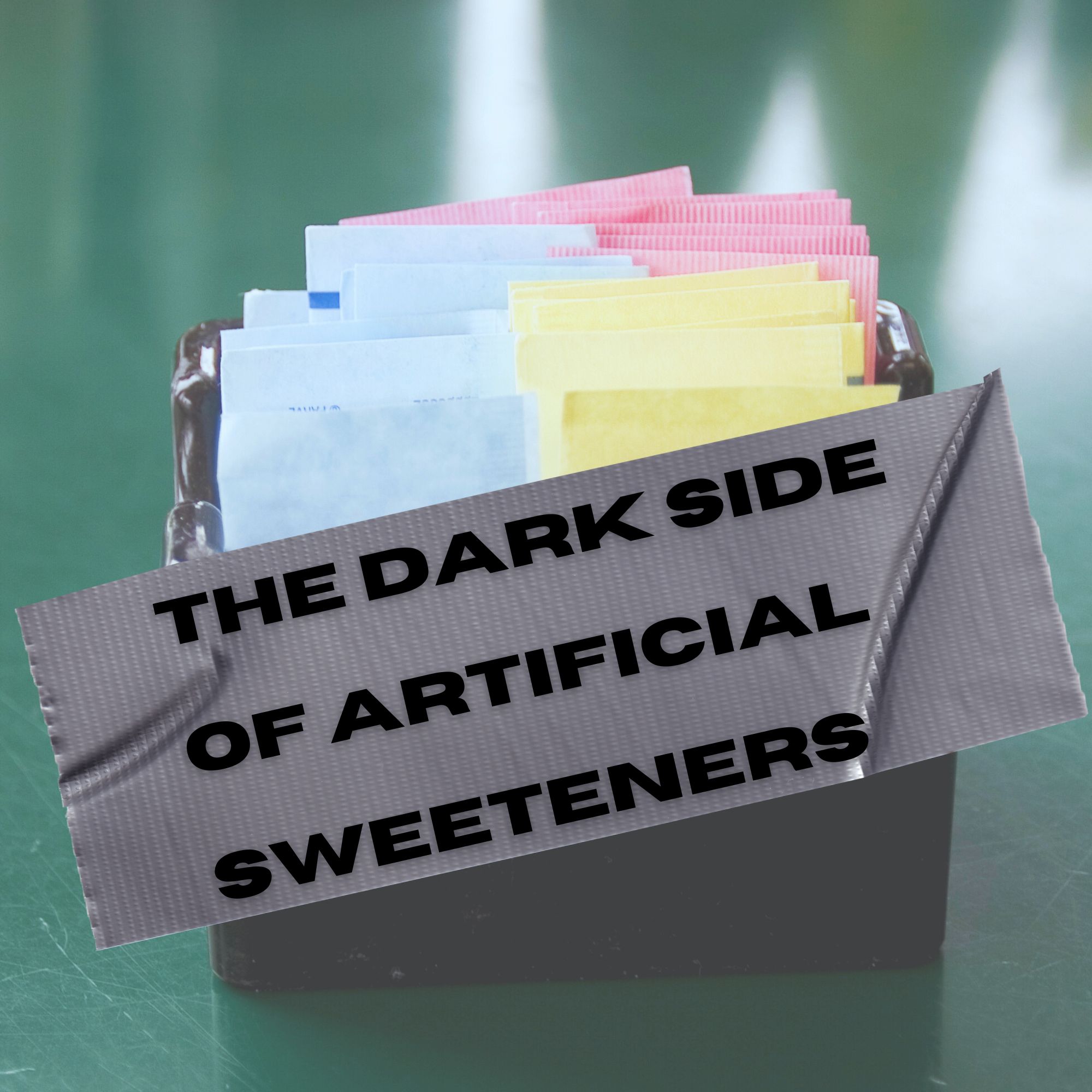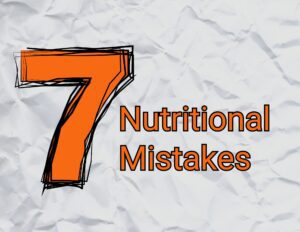Is the price of buying “sugar-free” worth it? Artificial sweeteners are a low-calorie alternative to sugar. They’re used in an abundance of packaged foods and beverages these days. However, despite their perceived benefits, there is growing concern about the potential negative effects associated with their consumption.
Just this month, the World Health Organization’s (WHO) cancer research agency, the International Agency for Research on Cancer (IARC), finally classified aspartame as “possibly carcinogenic”. This, of course, kicked off a firestorm of media reports and FDA (Food and Drug Administration) apologists to counter, and say there is no link to cancer. In this article, we aim to explore the darker side of artificial sweeteners and shed light on the potential risks they pose to our health. At Fast.Eat.Live. we always strive to encourage our community to choose natural whole foods, that have been around for centuries, and to seek the best sourcing of these foods.
Our bodies have been designed perfectly to recognize foods and react to them. This happens by signaling hormones, activating epigenetics (expression of your DNA and genes), and igniting bodily processes. We use our senses in this process to kick-start our digestive system. Smelling food prior to eating it, and tasting food when its inside of our mouth, are ways that we stayed connected to our food sources. The sense of smell alone has been shown to have a Pavlovian appetite response and start the flow of gastric juices. Our ancient ancestors used their olfactory system to recognize edible foods and avoid ones that might be spoiled with bacteria that would harm them. Of all the human senses, the sense of smell is the one most connected to memory. This makes sense, as consuming food is critical for life.
Artificial sweeteners, such as aspartame, sucralose, and saccharin, may disrupt the delicate balance of our metabolic processes. Research suggests that these sweeteners can lead to an increase in appetite, resulting in overeating and weight gain. Artificial sweeteners are highly concentrated, meaning that for the same physical amount, they can be between 200-13,000 times sweeter than sugar. By providing an intense burst of sweetness, without the corresponding caloric intake, artificial sweeteners may confuse our body’s natural response to sugar, leading to metabolic dysregulation and a higher risk of obesity, type 2 diabetes, and metabolic syndrome.
When we replace naturally sweetened foods with alternatives, it alters our gut microbiome. Our gut is home to trillions of beneficial bacteria that play a vital role in maintaining our overall health. Artificial sweeteners have been shown to negatively affect the composition and diversity of the gut microbiota. This disruption can lead to metabolic disorders, inflammation, and impaired immune function. Moreover, studies have suggested that artificial sweeteners may contribute to glucose intolerance by altering the balance of gut bacteria that regulate glucose metabolism. When we consume fruit and their natural sweeteners (fructose & glucose), we also consume vitamins, minerals, fiber, water, and phytochemicals. Our gut biome requires all of these resources to sustain a healthy balance so we can thrive.
The concept of supplying a low-calorie or zero calorie replacement for natural sugar was intended to help people avoid overconsumption. The goal was to allow people to eat sweet foods without having a negative blood-glucose consequence or influence weight gain. However, this whole idea was flawed. As nutrition coaches, we prefer to connect the benefits of naturally sweet foods with pleasure and reward. As mentioned above, sweet foods in nature have nutritional value and provide healthy benefits. Also, if consumed in moderation, they will provide a dopamine release (the happy hormone) and make you feel good mentally. One of the ironic and unintended consequences of using artificial sweeteners, is an increased craving for sweet foods. Regularly consuming artificial sweeteners can dull our taste buds’ sensitivity to sweetness, making us more inclined to seek out highly-sugared foods. This can create a vicious cycle of craving, as individuals turn to more sugary options to satisfy their dulled sweet receptors, ultimately leading to excessive sugar consumption and potential health problems. As mentioned, scientists believing they were going to help people to have access to sweet foods without consequences, was a faulty idea from the onset. As a society we should learn to balance indulgences within a healthy lifestyle.
More troubling news is that emerging evidence suggests that artificial sweeteners may have adverse effects on our neurologic health. Some studies indicate that these sweeteners, especially aspartame, can cross the blood-brain barrier and interfere with brain function. They have been associated with headaches, migraines, dizziness, and even mood disorders. While more research is needed to establish a definitive link, the potential neurological impact raises concerns regarding the long-term safety of artificial sweetener consumption. As we add more chemicals into our environment and food supply, with ever-increasing prescription drug and recreational drug use, we increase the potential dangers of these chemicals interacting with one another. Remember, our bodies are continually altering our epigenetics based on our environment, both internally and externally.
Within our lifestyle nutrition system here, our main focus is to teach people to eat nutrient-dense, whole foods that promote happiness and health. Our aim is to have our clients limit processed foods and avoid added chemicals. Helping you to improve your metabolic health by eating real foods is important to us. If you can do this, while learning to focus on enjoying the foods and beverages you love with your family and friends, it’s a huge bonus. Community, after all, is the key to longevity. Our process is to match the weekly 3-phase mechanism to your busy social lives and to help you focus on making better overall choices.
With this is mind, it is important to remember that choosing artificial sweeteners as a substitute for genuine sugar or natural low-calorie sweeteners can inadvertently affect our overall diet quality. People may assume that by cutting out sugar, they can consume unlimited amounts of other high-calorie, low-nutrient foods without consequence. This mindset can lead to an imbalanced and a less nutritious diet, contributing to deficiencies in essential nutrients and an increased risk of chronic diseases, such as cardiovascular disease.
While artificial sweeteners have gained popularity as a sugar substitute, it is crucial to recognize the potential negative effects they may have on our health. Metabolic disruption, altered gut microbiota, increased sweet cravings, potential neurological effects, and the impact on overall diet quality, all highlight the need for caution. Moderation and a focus on whole, nutrient-dense foods remain key to maintaining a healthy lifestyle.
Natural sweeteners like raw honey, pure maple syrup, agave nectar, and cane sugar in moderation are much better for your body than artificial sweeteners, like those mentioned in this article. However, there are also lower calorie or eve zero calorie natural sweetener options that you can replace sugars with, that do not cause a spike in blood sugar. Here are just a few of the ones we recommend to our clients: Liquid Stevia, powdered Stevia packets (which are great for on-the-go), Monkfruit Sweetener, Erithritol, or combination blends like Stevia+Erithritol packets. If you know where to look, you’ll find some smaller companies who have developed fantastic all natural, no sugar sweeteners we are thrilled to recommend. Check out NuNaturals chocolate and maple syrup. You can also head over to https://artfulpalate.com for plenty of recipes and tips using some of these alternatives.
For further health coaching on this topic and more reach out via our contact page on this website.




